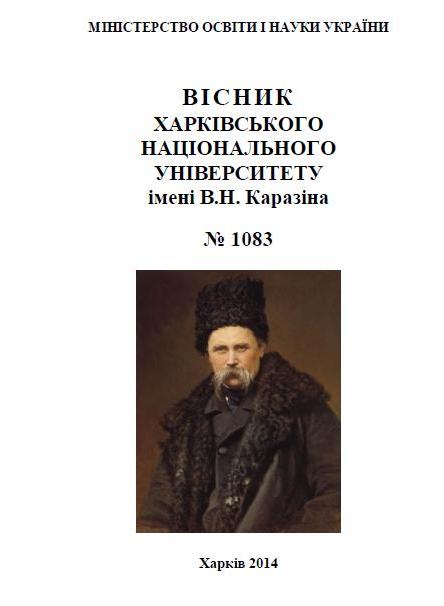Ю.М. ЛОТМАН КАК ФИЛОСОФ ТЕКСТА
Abstract
В статье рассмотрены особенности творения Ю.М. Лотманом своего концептуального
поля исследования. Позже это было определено как «всеобщая гуманитарная наука, или новая
всеобщая антропология». Научная деятельность ученого была тесно связана с деятельностью
московской семиотической группы. Отмечено, что на формирование структурно-семиотической
культурологии Ю.М. Лотмана наиболее существенно повлияли труды Р. Якобсона по общей
теории языка, русской литературе, поэтике и семиотике, а также и труды М.М. Бахтина,
исследователя языка, эпических форм повествования и жанра европейского романа.
Ключевые слова: семиотика, московско-тартуская школа, философия текста, поэтика,
эпические формы.
В.С. Сломський. Ю.М. Лотман як філософ тексту. У статті розглянуті особливості
творіння Ю.М. Лотманом свого концептуального поля дослідження. Пізніше це було визначено як
"загальна гуманітарна наука, або нова загальна антропологія". Наукова діяльність ученого була
тісно пов'язана з діяльністю московської семіотичної групи. Відмічено, що на формування
структурно-семіотичної культурології Ю.М. Лотмана найсуттєвіше вплинули праці Р. Якобсона
по загальній теорії мови, російській літературі, поетиці і семіотиці, а також і праці
М.М. Бахтина, дослідника мови, епічних форм оповідання і жанру європейського роману.
Ключові слова: семіотика, Московсько-Тартуська школа, філософія тексту, поетика, епічні
форми.
V.S. Slomski. Yu.M. Lotman as a philosopher of text. For many years Lotman has been
engaged in the creation of his conceptual field of research. He created what Y. Stepanov later designated
as "general humanities , or new universal anthropology". Scientific activity of Y.M. Lotman is closely
linked with the activities of the Moscow semiotic group when in 1964 they were united around the
presentation of results of research of Russian literature from the point of view of the structural-semiotic
approach to formal language. The formation of structural-semiotic Y.M. Lotman’s culture study most
significantly influenced the works of Roman Jakobson on the general theory of language, Russian
literature, poetics and semiotics.
A great influence on the formation of scientific views of Lotman's works have also Bakhtin,
researchers language , epic narrative forms and genres of the European novel. In the 1960s, formed the
central concept of the Moscow-Tartu school of semiotics – the "secondary modeling systems." This
secondary system Lotman considered art, and above all fiction. According to him, every work of art
organizes a natural language text on the new rules of logic, allowing a person to create a "model" of the
world and himself. Y.M. Lotman is always in the focus of attention of scientists in the humanities.
Moreover, today, intellectual dialogue with Lotman develops incrementally. And we can safely say that
the personality of the scientist becomes a landmark for understanding the ways of the domestic and world
science in the XXI century.
Key words: semiotics, Moscow-Tartu school, philosophy of text, poetics, epic forms.




